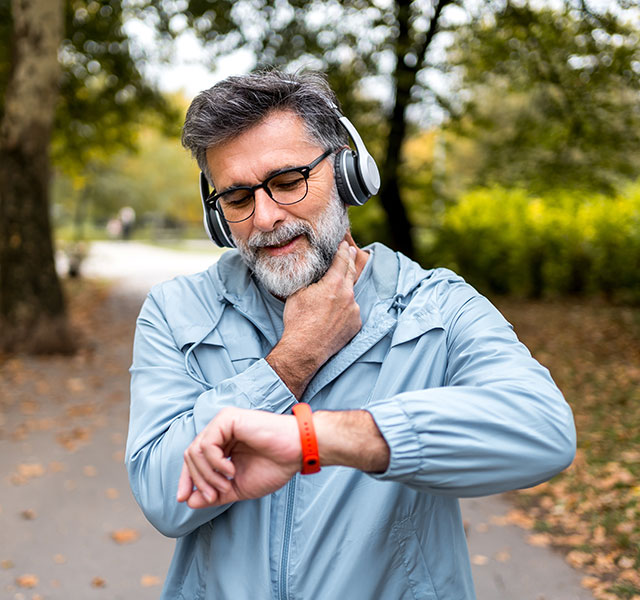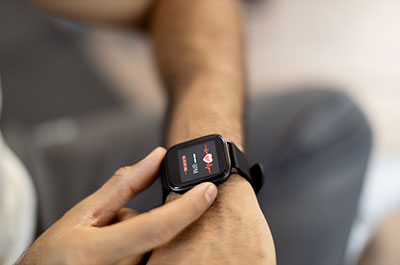Measuring fitness can be a bit subjective. The idea of “getting in shape” is often motivated by one’s personal image and wellness goals. However, accurately measuring an improvement in one’s fitness is difficult outside of a laboratory. Which then begs the question, are there simpler ways for the rest of us to measure fitness and assess those changes over time?
You may already be aware of a couple ways. Popular wearable devices have built-in algorithms to estimate your fitness based upon factors including age, gender, steps, exercise heart rate and resting heart rate. Additionally, some health professionals may inquire about a patient’s ability to walk up a flight of stairs or two as a subjective way to assess exercise capacity. Regardless of the method used, if you start with a regular exercise program, it can be expected that over time your fitness level will improve (you might simply notice being able to climb stairs with less fatigue or shortness of breath).
Another measure of fitness, according to Steven Keteyian, PhD, director of the Preventive Cardiology Unit at Henry Ford Health, is your recovery heart rate. Here, Dr. Keteyian explains how to calculate and potentially improve your heart rate recovery.
Calculating Heart Rate Recovery
“Heart rate recovery refers to the number of beats your heart rate decreases in the first minute or two after stopping exercise,” says Dr. Keteyian.
To calculate your heart rate recovery, use a fitness tracker or heart rate monitor to measure what your heart rate is while active and then again one minute and two minutes after you stop or slow down.
As an example, imagine you are out for a 30-minute, brisk walk. Toward the end of that walk, your heart rate may get up to 150 bpm (beats per minute). One minute after slowing down or stopping, you again measure your heart rate, and it has gone down to one minute after slowing down or stopping, if you again measure your heart rate, it gets down to 135 bpm (15 beats lower). After two minutes, it may have decreased further to 120 bpm (30 beats lower). These values help create a picture of how well your heart recovers from the biologic stress of exercise.
“We expect that as you improve your aerobic or cardiorespiratory fitness over time with a regular exercise program, the magnitude of the decrease in your heart rate and one and two minutes after exercise becomes greater. Specifically, your heart rate recovers more quickly,” says Dr. Keteyian.
Not to mention that getting in shape also benefits your overall health, not just your fitness. Being active is associated with a lower risk of heart disease, high blood pressure, diabetes and many types of cancer. To meet this goal, experts recommend 150 minutes of moderate intensity exercise each week.
Factors That Impact Your Heart Rate Recovery
Measuring heart rate recovery is a rudimentary approach to measuring change in fitness. And many other factors such as not getting enough sleep or taking certain medications can impact your heart rate recovery results.
“The type and intensity of exercises you choose matter too,” says Dr. Keteyian. “Specifically, focus on aerobic-type exercises or an exercise that increases your heart rate and you can maintain such for some time (e.g., 30 min).”
This may include:
- Walking
- Running or jogging
- Swimming
- Rowing
- Dancing or taking a Zumba class
- Using an elliptical
It is important to note that each time you plan to measure heart rate recovery, you should be sure to achieve the same heart rate during exercise before stopping each time.

Results will vary from person to person. Someone who doesn’t exercise at all versus someone who exercises regularly will likely see a more dramatic change in heart rate recovery over time. Just remember that even if improvement is small, any amount of improvement is good.
“Most importantly, you cannot compare your heart rate recovery to others,” says Dr. Keteyian. “Individual responses are unique – your fitness level, genetics and any additional health factors can influence the results you observe. Remember that heart rate recovery is only one marker of fitness.”
If you have known risk factors of cardiovascular disease or other health conditions, it may be worth it to talk to your doctor about how improving on your fitness could help your health.
Reviewed by Dr. Steven Keteyian, a cardiologist who sees patients at Henry Ford West Bloomfield Hospital, Henry Ford Medical Center - Livonia and Henry Ford Medical Center - Second Avenue in Detroit.



